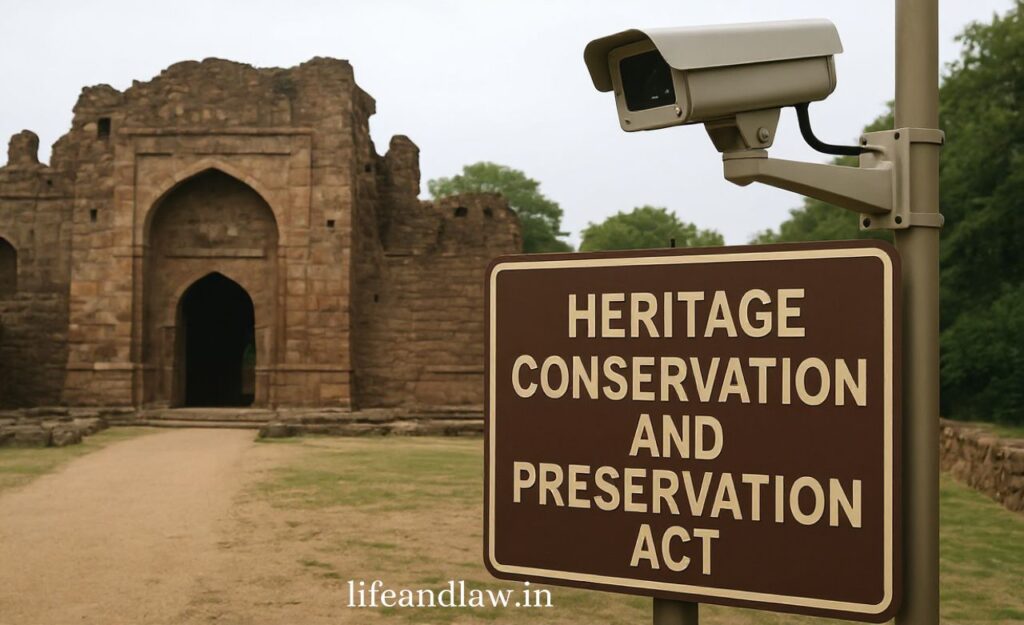Trending

Our heritage is an important emblem of our identity, reflecting the traditions, arts, architecture, and history passed down from our forefathers. Preserving it reconnects us with the past and guarantees that future generations inherit this rich legacy. Protecting historical monuments, cultural locations, and customs is a shared social and cultural responsibility.
However, urbanisation, tourism, and climate change pose severe risks to our legacy. In this situation, the legislation is important not just for protection, but also for active conservation. The aim of this article is to look into how legal frameworks might help conserve our cultural heritage
World Heritage Day, also known as the International Day for Monuments and Sites, is observed on April 18 each year. The subject for 2025, which marks the 60th anniversary of ICOMOS (International Council on Monuments and Sites), is “Heritage at Risk from Disasters and Conflicts: Preparedness and Lessons from 60 Years of ICOMOS Action.”
This issue focuses on creating awareness about the conservation of cultural heritage threatened by disasters and wars. Natural catastrophes, war, climate change, and urbanisation have all posed threats to historical sites and cultural practices. As a result, disaster preparedness, mitigation, and reconstruction are essential for heritage conservation.
Heritage protection is critical to the preservation of society’s cultural and historical identities. It helps us comprehend our predecessors’ lifestyles, values, and traditions. In today’s quickly changing world, we must conserve our past so that future generations can experience and learn from history.
Heritage protection also has economic benefits because protected monuments and sites encourage tourism. This creates jobs and supports the local economy. Furthermore, shared history creates societal togetherness and increases cultural pride.
Laws have an extremely important role in the preservation of cultural heritage places and customs. Laws not only give protection, but also lay the groundwork for conservation, restoration, and the avoidance of unauthorised actions at heritage assets. For example, the Ancient Monuments and Archaeological Sites and Remains Act, 1958 was enacted to conserve historical and ancient monuments. This regulation effectively prevents unauthorised construction and encroachment on protected sites. Furthermore, sites designated as UNESCO World Heritage Sites are given exceptional protection, and international collaboration and finance are made available for their preservation.
However, the application of legislation is frequently ineffective. Unauthorised building, urbanisation, and tourism all pose risks to heritage sites. As a result, greater enforcement measures and cooperation from local communities are required. Using current technology to maintain monuments and focussing on their studies is equally critical. In other words, while legislation can protect heritage places, sustainable conservation needs active engagement from all members of society.
Legal challenges frequently emerge in the safeguarding of heritage sites. Some significant obstacles arise from the law enforcement procedure itself –
Lack of awareness of rights: Many individuals and communities are unaware of their legal rights in relation to their cultural heritage. As a result, they confront difficulties such as monument neglect, unauthorised development, and meddling.
Lack of enforcement: Laws exist, however they are not adequately enforced. Compliance with legislation becomes difficult as a result of local government negligence or a lack of resources.
Urbanisation and unauthorised constructions: Unauthorised constructions on heritage sites arise due to the rapid pace of urbanisation and other developmental factors. This urbanisation could result in the destruction of cultural sites. Heritage sites are sometimes overlooked in development initiatives, putting them at risk.
Excessive tourism poses a threat to heritage sites: Increased tourism puts pressure on heritage sites and monuments. As a result, protecting and maintaining these places becomes increasingly difficult.
Awareness and education: It is critical to educate individuals about the importance of their cultural heritage and make them aware of applicable legislation. This can help to increase community cooperation in conserving heritage assets.
Strict Enforcement of Law: More effective law enforcement is essential, such as rigorous inspections, suitable penalties, and fast action against unauthorised structures.
Developmental Limits and Planning: To conserve heritage sites, legal limits should be placed during the urbanisation and development process. This includes designating protected zones and assuring the preservation of heritage sites during development initiatives.
Public–Private Partnerships: It is critical to increase participation from local communities, governments, and voluntary organisations. This partnership can lead to successful solutions for security systems, maintenance, and restoration.
Our cultural heritage holds deep historical and identity-based significance, making its preservation a shared responsibility. Effective laws and their enforcement play a key role in safeguarding heritage sites. However, legal measures must be supported by increased public awareness to ensure lasting impact.
Adv. Abdul Mulla emphasizes the importance of community involvement, where the government, citizens, and local bodies work collectively. His insights, often shared through his legal platforms like www.lifeandlaw.in and www.asmlegalservices.in, reflect a commitment to cultural preservation within the bounds of legal ethics.
Adv. Abdul Mulla (Mob. No. 937 007 2022) is a seasoned legal professional with over 18 years of experience in advocacy, specializing in diverse areas of law, including Real Estate and Property Law, Matrimonial and Divorce Matters, Litigation and Dispute Resolution, and Will and Succession Planning. read more….
Copyright BlazeThemes. 2025